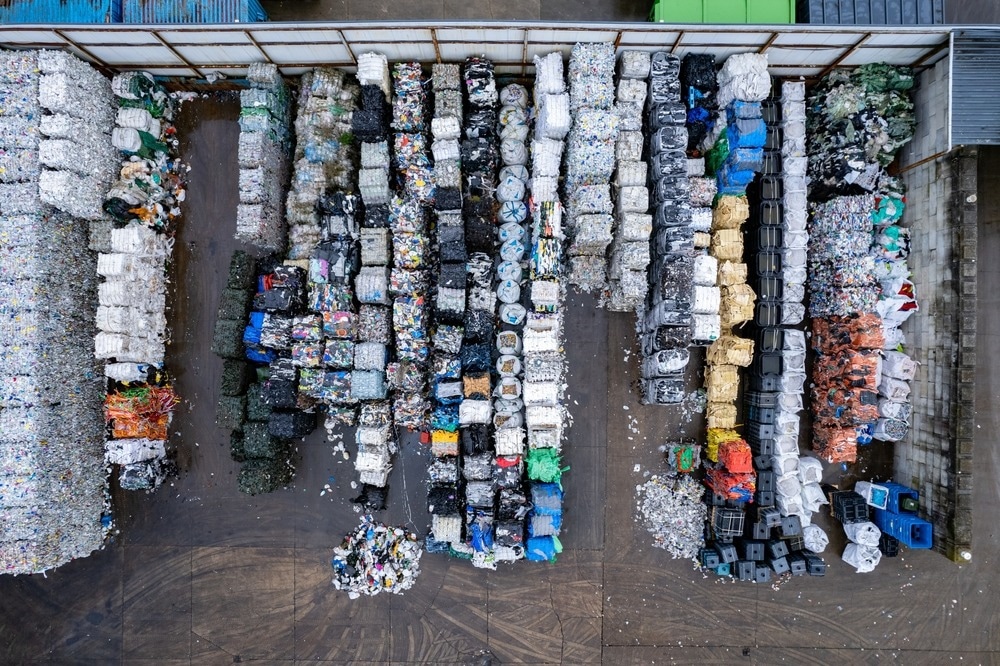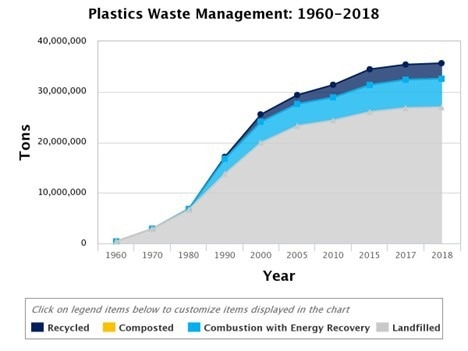Hydrogen is vital in fuel cell technology, energy production, and numerous other applications. Plastic waste, produced in substantial amounts, is a significant environmental issue and a potential source of hydrogen. FusionOne, a Canada-based company, is highlighting plastic’s potential as a hydrogen source through novel sustainable solutions. Its technology converts plastic waste accumulated in landfills into hydrogen and electricity.

Image Credit: czjiri/Shutterstock.com
Plastic Waste: A Major Threat
The United States Environmental Protection Agency (EPA) and National Renewable Energy Laboratory (NREL) have assessed the harmful effects of plastic waste in terms of environmental degradation.
As per EPA, plastics belong to a rapidly expanding municipal solid waste (MSW) category. While plastics are present in all main MSW fields, containers and packaging accounted for more than 14.5 million tons of plastic waste in 2018.
In 2018, the United States produced 35.7 million tons of plastic waste, 12.2% of MSW production. In 2018, the total quantity of plastics burned in municipal solid waste was 5.6 million tons. This represented 16.3% of all MSW burned for energy recovery that year. In 2018, 27 million tons of plastic were discarded in landfills. This represented 18.5% of all landfilled MSW.

Plastic Waste Management Statistics in the United States. Image Credit: United States Environmental Protection Agency
The National Renewable Energy Laboratory (NREL) of the U.S. Department of Energy (DOE) estimated that the energy from landfilled plastic debris in 2019 was sufficient to generate 5% of the power consumed by the transportation industry or 5.5% by the industrial sector.
These statistics indicate that plastic waste constitutes a significant source of greenhouse gas emissions as well as ground and air pollution. The data highlights the need to develop sustainable methods for converting plastic waste into energy.
FusionOne: Pioneer of Hydrogen Production from Plastic Waste
Using FusionOne’s HydroPlasTM reactor equipped with the latest thermal decomposition technology, the novel method of processing plastic waste from landfills enables hydrogen production with zero emissions.
Plastic Waste Decomposition Process by FusionOne
Instead of the traditional pyrolysis and steam reforming methods, the team at FusionOne has developed a plastic decomposition and systematic conversion system to ensure optimum hydrogen production with no harmful byproducts.
Instead of processing individual batches, the technique focuses on collectively accumulating plastic waste from landfills in bales, which are then transported to the processing sites.
Traditionally, plastic waste had to be reduced to an optimum size for processing. However, the HydroPlasTM reactor developed by FusionOne is equipped with innovative technology to fragment the plastic waste to the appropriate size.
Plastic waste from landfills in the reactor is subjected to a very high-temperature oxygen-scarce environment, ensuring polymer chain breakdown with zero emissions. The long polymer chain of plastics is disintegrated into a hydrogen-rich syngas system.
The syngas is cooled and placed into a peripheral system, converting them into valuable products and energy. The novel method reduces time and process cost.
How is the HydroPlasTM Reactor a Significant Improvement over Traditional Industrial Reactors?
HydroPlasTM is the next generation of plastic decomposition reactor which produces hydrogen from plastic wastes in a sustainable green method. Utilizing a plasma flame, the HydroPlasTM reactor ionizes and dissociates plastic refuse into its component compounds.
The plasma torch produces temperatures of up to 10,000 °C, reducing plastic waste to a mixture of gases such as hydrogen and useful carbon products and gases. Hydrogen is separated and captured for use as an energy source after the gases have been chilled and purified.
It can potentially manage diverse carbon-based substrates, but the plastic waste decomposition process has specifically been refined. Numerous renewable commercial products are generated as the process output, including fuel cell-grade purified hydrogen and emission-free electricity.
The HydroPlas system offers considerable benefits over its counterparts. The low-cost processing due to the requirement of minimal pre-processing equipment and utility connection is a major advantage. It ensures zero emissions with almost no resource wastage. The adaptability of the HydroPlasTM system as per the outputs to ensure sustainable production puts it miles ahead in the modern plastic waste processing race.
The plasma process utilized in the HydroPlasTM reactor is more effective than conventional techniques, such as pyrolysis and gasification. This means that the same quantity of plastic waste can produce a more significant amount of hydrogen.
The HydroPlasTM reactor is optimized to be more compact than conventional reactors, allowing for simpler transportation and installation. This also increases its accessibility for small-scale operations.
The HydroPlasTM reactor is scalable according to the requirements of the operation, indicating its applicability to industrial and small-scale applications.
The Michigan, USA, Project: A Milestone in Sustainable Energy Production
The Michigan, USA, Project is a pre-commercialization stage FusionOneTM technological prototype. It combines all of the standalone demonstrated innovations into a completely functional system.
The location chosen by the company has been awarded provisional use as a recycling premise, along with all necessary waste management permits.
Before commencing commercial operations on-site, FusionOneTM plans to process numerous plastic waste collections and optimize the incorporation of the Hydrogen Synthesis facility to demonstrate the system's readiness.
The site is equipped with vehicle and rail terminals and a rail transport facility for rapidly and effectively transporting feedstock and shipment of off-take goods.
Connecting the local region with hydrogen-powered infrastructure paves the way for rail and vehicle HFCVs and enables collaboration with local administrations to develop green transit alternatives.
The Future of Hydrogen Production from Plastic Waste
The synthesis of hydrogen from plastic waste is a viable scientific and technological area. The need for renewable energy sources will increase as the world becomes more concerned with recycling and waste reduction.
There is continuous research into novel catalysts and elements that can be employed to enhance the process's efficacy and durability further.
Nonetheless, there are still obstacles to surmount. Developing a reliable supply chain for plastic waste feedstock, which is challenging to procure in some regions, is a significant challenge. A trustworthy supply chain will aid in effectively collecting plastic waste from landfills.
The development of algorithms for determining the presence of plastic pollutants in a landfill is yet another field with enormous research potential.
Producing hydrogen from plastic wastes is a significant step in sustainable energy production.
FusionOne and its novel technologies efficiently generate hydrogen from plastic wastes and provide several industries, such as the automotive and electric power generation sector, with an environment-friendly operating framework.
Continue Reading: The Risks of Large-Scale Hydrogen Production
References and Further Reading
FusionOne, 2023. Plastic Waste to Hydrogen Energy. [Online] Available at: https://www.fusionone.co/
H2 Tech, 2022. PowerTap's FusionOne on track to deliver first waste-to-H2 system in Michigan. [Online] Available at: https://h2-tech.com/news/2022/01-2022/powertap-s-fusionone-on-track-to-deliver-first-waste-to-h2-system-in-michigan/
National Renewable Energy Laboratory, 2022. NREL Calculates Lost Value of Landfilled Plastic in U.S. [Online] Available at: https://www.nrel.gov/news/press/2022/nrel-calculates-lost-value-of-landfilled-plastic-in-us.html
Ganza, P. E., & Lee, B. (2023). A novel method for industrial production of clean hydrogen (H2) from mixed plastic waste. International Journal of Hydrogen Energy. Volume 48(40). 15037-15052. Available at: https://doi.org/10.1016/j.ijhydene.2023.01.010
Thompson, D., 2022. Turning the Tide on Plastic Contamination. [Online] Available at:https://www.sciencetimes.com/articles/36891/20220330/turning-the-tide-on-plastic-contamination.htm
United States Environmental Protection Agency, 2023. Plastics: Material-Specific Data. [Online] Available at: https://www.epa.gov/facts-and-figures-about-materials-waste-and-recycling/plastics-material-specific-data
Disclaimer: The views expressed here are those of the author expressed in their private capacity and do not necessarily represent the views of AZoM.com Limited T/A AZoNetwork the owner and operator of this website. This disclaimer forms part of the Terms and conditions of use of this website.